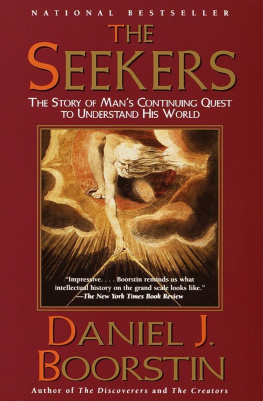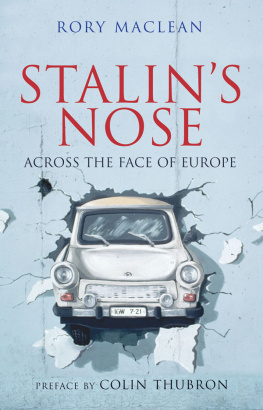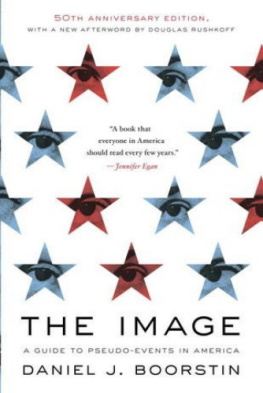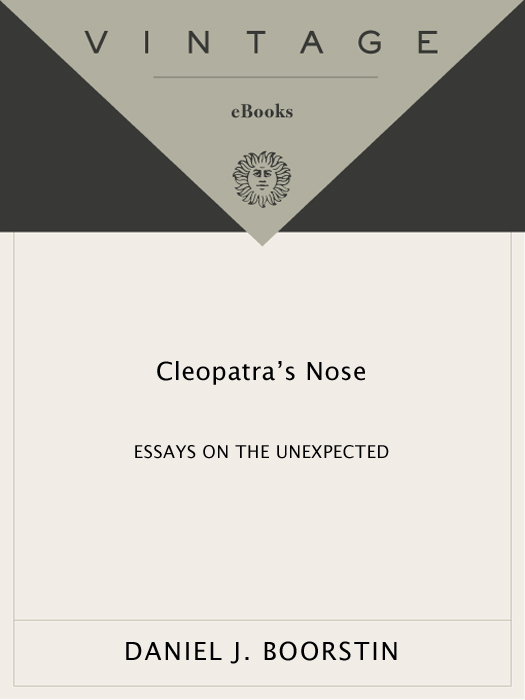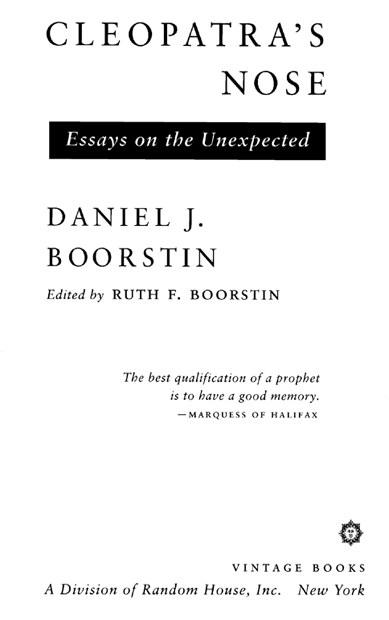ACCLAIM FOR
DANIEL J. BOORSTIN
Cleopatras Nose is full of large imagination and generous spirit. [Boorstin] has an enthusiastic optimism.
San Diego Union-Tribune
Boorstin has a magisterial gift.
Time
[Boorstin] provides fascinating details [and] shines as a traditional historian.
Minneapolis Star Tribune
Boorstin is inviting and provocative.
Wall Street Journal
Boorstin brings us into the presence of his subjects. With his sensitivity to their memorable words and deeds, he takes his readers to the source of their creativity.
Seattle Times/Seattle Post-Intelligencer
In these essays, which take on the role of the accidental and the trivial in history, the questions and the answers are both constructed out of Boorstins vast erudition.
Los Angeles Times
Boorstins love for the minutiae of history nurtures the collection.
Denver Post
BOOKS BY DANIEL J. BOORSTIN
Cleopatras Nose: Essays on the Unexpected
The Creators
The Discoverers
The Americans: The Colonial Experience
The Americans: The National Experience
The Americans: The Democratic Experience
The Mysterious Science of the Law
The Lost World of Thomas Jefferson
The Genius of American Politics
America and the Image of Europe
The Image: A Guide to Pseudo-Events in America
The Decline of Radicalism
The Sociology of the Absurd
Democracy and Its Discontents
The Republic of Technology
The Exploring Spirit
The Republic of Letters
Hidden History
The Landmark History of the American People
(with Ruth F. Boorstin)
A History of the United States
(with Brooks M. Kelley)
FIRST VINTAGE BOOKS EDITION, NOVEMBER 1995
Copyright1994 by Daniel J. Boorstin
All rights reserved under International and Pan-American Copyright Conventions. Published in the United States by Vintage Books, a division of Random House, Inc., New York, and simultaneously in Canada by Random House of Canada Limited, Toronto. Originally published in hardcover by Random House, Inc., New York, in 1994.
Grateful acknowledgment is made to the Edna St. Vincent Millay Society and Elizabeth Barnett, literary executor, for permission to reprint six lines from Upon this age, that never speaks its mind, by Edna St. Vincent Millay. From Collected Poems, HarperCollins.
Copyright 1939, 1969 by Edna St. Vincent Millay and Norma Millay Ellis. Reprinted by permission of Elizabeth Barnett, literary executor.
The Library of Congress has cataloged the Random House edition as follows: Boorstin, Daniel J. (Daniel Joseph). Cleopatras Nose / by Daniel J. Boorstin : edited by Ruth F. Boorstin. 1st ed.
p. cm.
eISBN: 978-0-307-75652-7
1. Civilization, ModernHistory.
. ScienceHistory. 3. Science and civilization.
I. Boorstin, Ruth Frankel.
II. Title.
CB358.B63 1994
909dc20 94-1079
v3.1
To our grandchildren,
Couriers of the Unexpected
Foreword
Cleopatras nose, had it been shorter, Pascal speculated, the whole face of the world would have been changed. When we focus on turning points in history we recognize the crucial role of the accidental and the trivial. We have no doubt that the personal charms and vices of Caesar, Queen Elizabeth, Napoleon, Disraeli, Hitler, Stalin, FDR, and JFK have shaped events. But we are reluctant to believe that the future will be as full of surprises as the past. Even the unpredicted sudden collapse of the Soviet empire has not chastened us, and we go on confidently predicting the course of democracy and the world.
These essays of the last few years explore some of the surprising novelties and unexpected continuities in our recent past. How has technology opened new realms of ignorance and given our times a claim to be the age of negative discovery? How has our nation, celebrated for material successes, come to be troubled by a new obsession with the inner world of conscience? How did the printing press make our Constitution possible? And how did New World technology provide us with a capitol of classical design with a cast-iron dome? The piquant contrast between Tocquevilles America and Custines Russia gives us some clues to historys claim to be the cautionary science.
The fourth kingdom, the machine kingdom where we live, reveals how popular expectations inherited from the sciences have been frustrated. How can we come to terms with the need for the unnecessary and the deepening paradoxes of science in a time of the increasing political power of common sense? All of which adds up, from diverse times and places, and especially from the American experience, to the perils of prophecywhich our American optimism might prefer to call the delights of the unexpected.
Contents
I
REALMS OF DISCOVERY
II
TRIALS OF CONSCIENCE
III
NEW-WORLD OPPORTUNITIES
IV
THE CAUTIONARY SCIENCE
V
THE FOURTH KINGDOM
VI
A PERSONAL POSTSCRIPT
I
REALMS OF DISCOVERY
Upon this gifted age, in its dark hour,
Falls from the sky a meteoric shower
Of facts. they lie unquestioned, uncombined.
Wisdom enough to leech us of our ill
Is daily spun; but there exists no loom
To weave it into fabric.
Edna St. Vincent Millay, Huntsman, What Quarry
1
The Age of Negative Discovery
When Albert Einstein was asked about forty years ago how the West had come to the idea of scientific discovery, he gave a simple answer. Development of Western Science, he explained, is based on two great achievements, the invention of the formal logical system (in Euclidean geometry) by the Greek philosophers, and the discovery of the possibility to find out causal relationship by systematic experiment (Renaissance). In my opinion one has not to be astonished that the Chinese sages have not made these steps. The astonishing thing is that these discoveries were made at all. Einstein was surely correct in seeing scientific discovery as an institution of Western culture. His characteristically simple explanation, however, does not take account of the remarkable transformations of the venture of discovery in this century.
The works of discovery in every age shapeand shake upthe thinking of the whole literate community. And this effect has multiplied with the rise of democracy and of literacy. The familiar example, of course, is how the works of Copernicus (14731543) and his followers disturbed Western culture with the realization that the earth was no longer the center. More recent examples are the impact of Darwinian biology and Freudian psychology. Nowadays, the space sciences, arcane and specialized though they have become, continue to have a profound and wide influence on the whole communitys thinking.
We in the lay community continue to reach for the meanings of scientific discoveries that are beyond our laymans understanding. We enjoy having our imagination titillated. How otherwise can we account for one of the most remarkable publishing phenomena of recent times? Stephen Hawkings short but difficult




